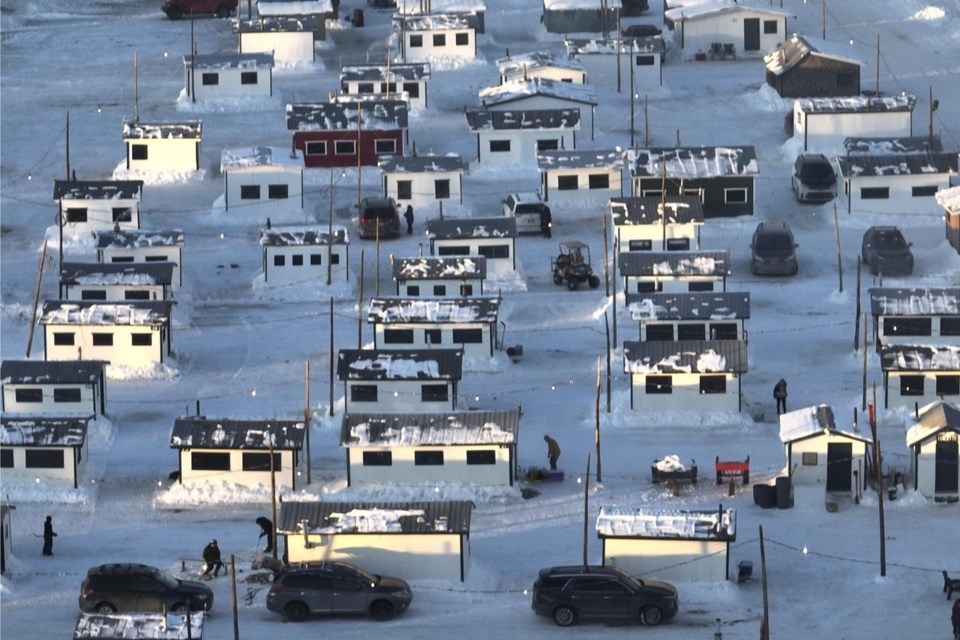SAGUENAY, Que. — There will be no colourful ice-fishing huts dotting the frozen water near Saguenay, Que., this year after mild winter weather forced authorities to cancel the popular tradition for the first time.
The municipality about 200 kilometres north of Quebec City announced last week that the ice wasn't thick enough to open the fishing villages at Anse-à-Benjamin and Grande-Baie, which normally feature hundreds of huts and cabins that are popular with tourists and locals alike.
The news was a huge shock and disappointment to people in the area, according to Rémi Aubin, who is president of a local fishing group.
"Ice fishing for the people of the Saguenay-Lac-St-Jean region is an activity that is not only recreational and economic, but also part of the culture of the people here," he said.
Aubin, who has been fishing through the ice since he was seven years old, said the Saguenay fiord's spectacular landscape, the quaint fishing villages that can reach over 1,000 huts and the presence of saltwater fish such as redfish and halibut combine to create a unique experience that attracts people from around the world and brings millions of dollars to the region.
But beyond the economic spinoffs for hotels, restaurants and tourism companies, fishing is a beloved activity passed down from generation to generation and a big part of people's lives, he said.
"It's a bit like their winter medicine that makes them feel good," Aubin said. "For some people, it's about travelling south in the winter. For them, it's their fishing hut. So we've taken away their happiness, and it even has an impact on people's mental balance."
The debate around whether to cancel the season was so heated that Contact Nature, the organization that manages the villages, posted a message on its Facebook page in early February pleading for respect amid what it called "defamatory allegations and personal attacks." On Monday, calls to the organization went to voice mail, with a message saying it was receiving too many calls to answer them promptly.
Dominic Arseneau, a spokesman for the city of Saguenay, said the decision to cancel wasn't made lightly. He said the ice at one site was about 27 centimetres thick — short of the 30 cm minimum for large vehicles and huts — while at the other site it was only about 20 cm.
"It's sad. Nobody was happy to make that decision and it was made with a heavy heart, but at the same time we can't play with people's safety," he said.
He noted that a survey carried out by the organization that manages the ice villages found that the majority of respondents — 58 per cent — preferred not to open for a season lasting four weeks or less. People who paid to reserve a spot on the ice will be refunded, he added.
Francis Girard, vice-president of the sport fishing association Association des Pêcheurs Sportifs du Québec, said the news is a "reflection of the climate changes we've seen in recent years."
He said ice fishing seasons in the province are starting later and ending earlier, especially in the southern parts of the province. What happened in Saguenay, he said, is "a sign that what we've seen in the south of the province is slowly extending northward and towards the east."
He said ice levels are thinner than they used to be in general, and that anecdotally he's hearing about more people needing to be rescued.
However, he said people can normally start ice fishing safely on foot starting at about 10 cm of ice — which is still present in many parts of the province. Ice villages, on the other hand, require much thicker ice because of the snowplows and trucks needed to install the huts.
Aubin said people in Saguenay are improvising, by heading out on the ice with lighter tents and snowmobiles or all-terrain vehicles instead of huts and trucks. He said people who do so proceed at their own risk, as is the case in most areas of the province.
This report by The Canadian Press was first published Feb. 13, 2024.
— By Morgan Lowrie in Montreal
The Canadian Press




